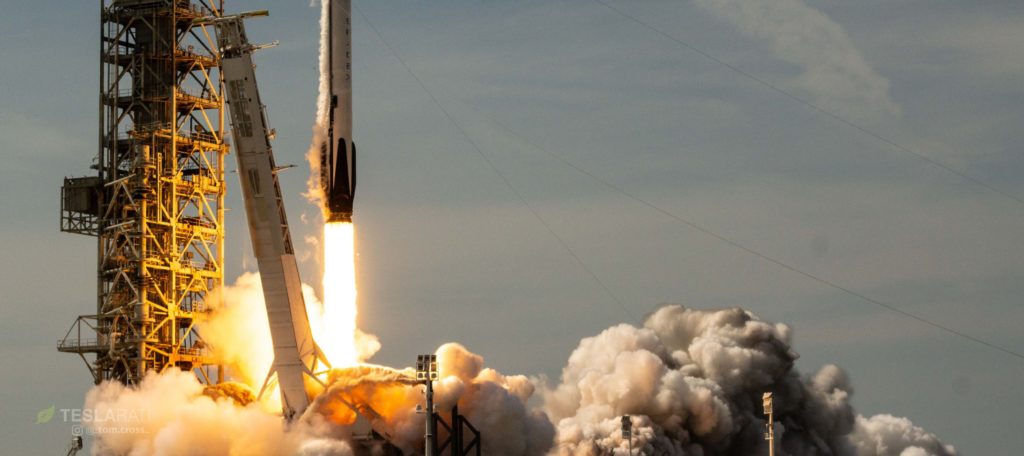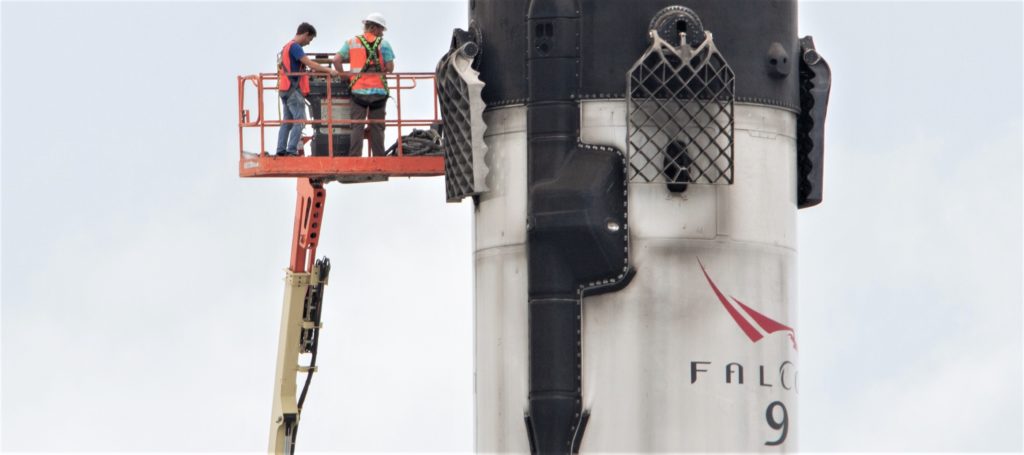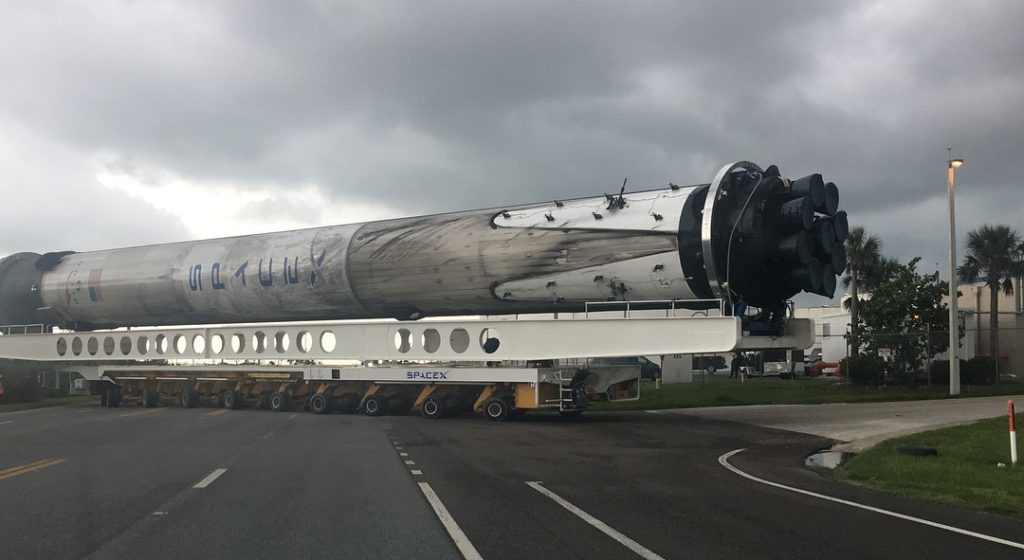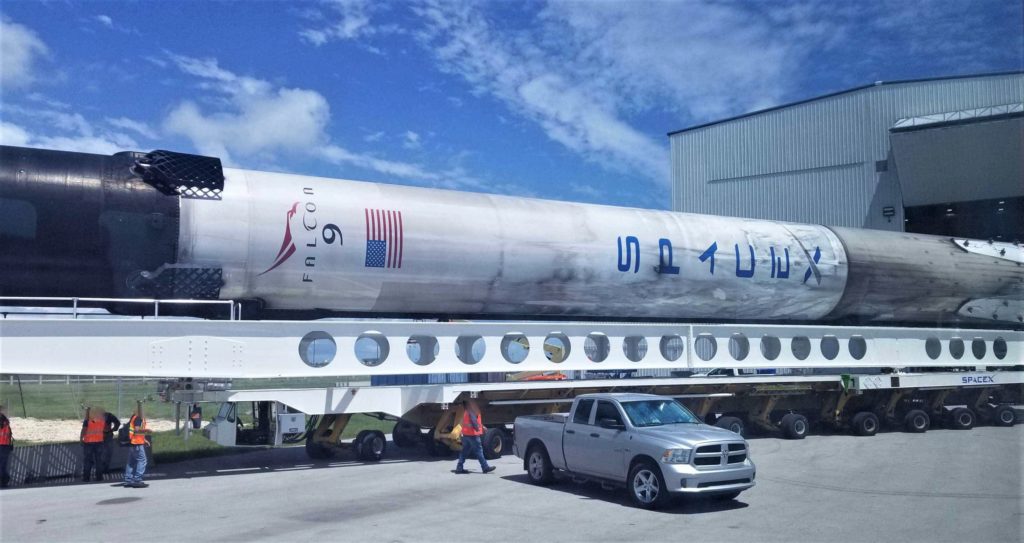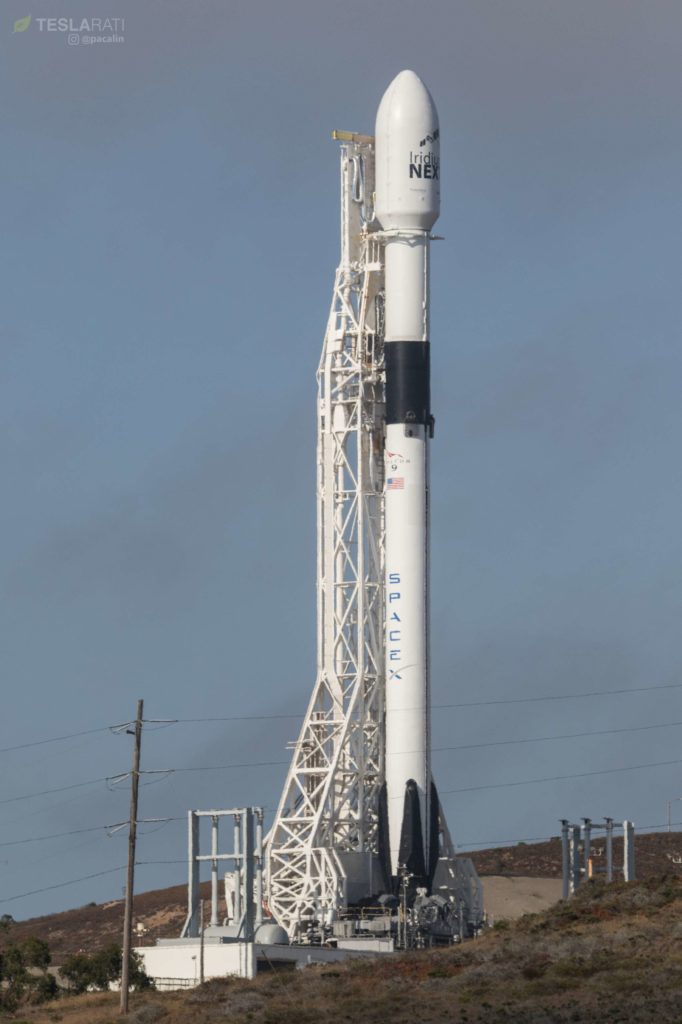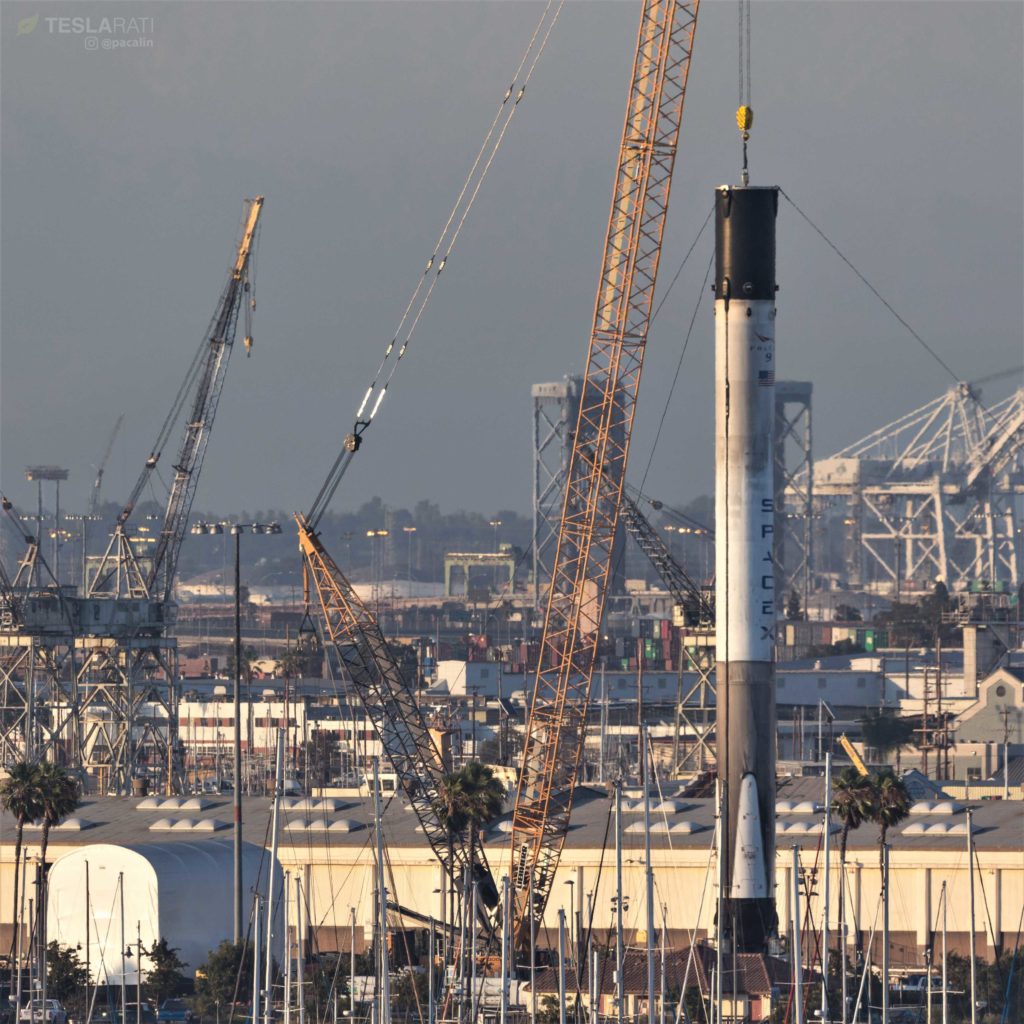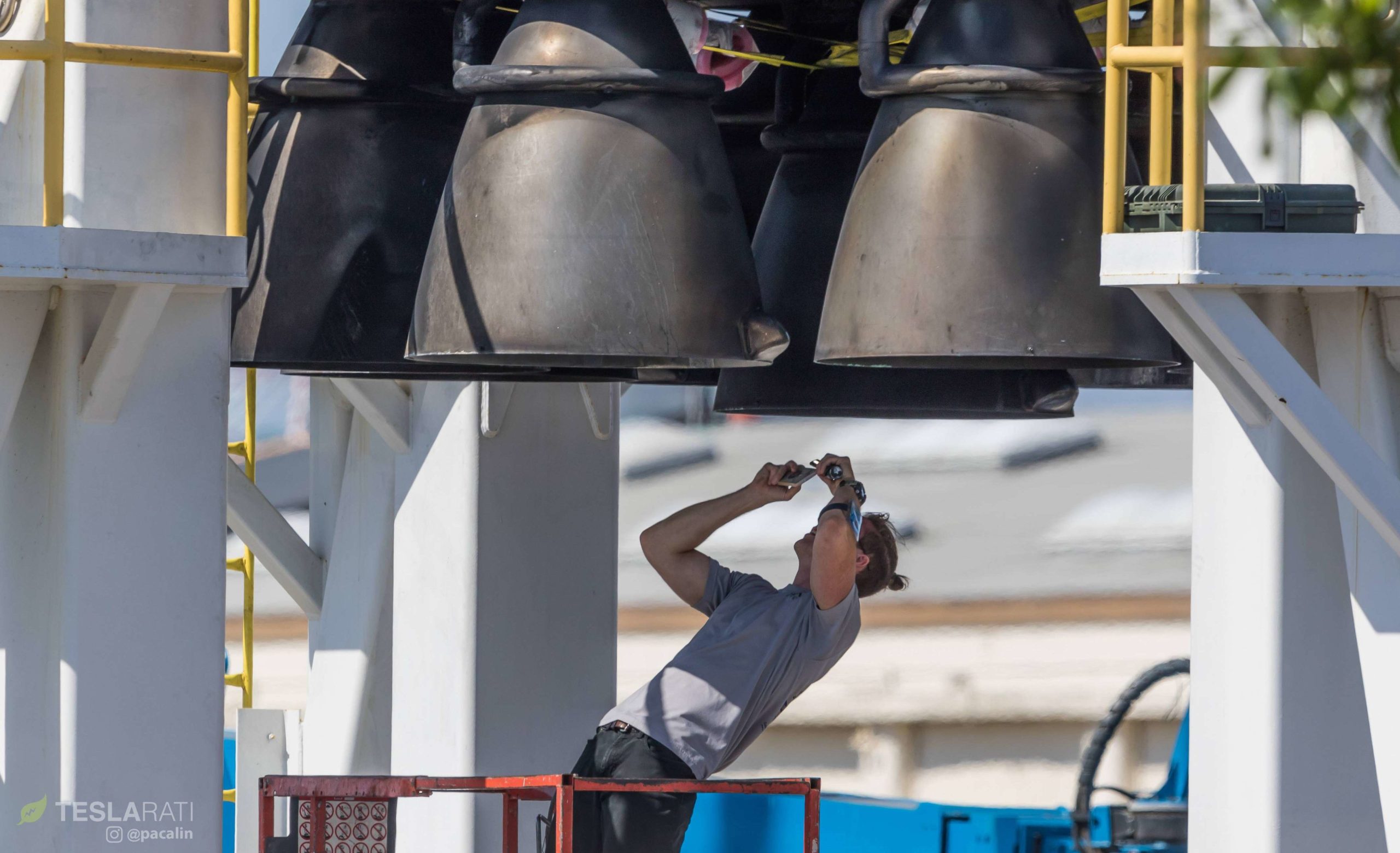
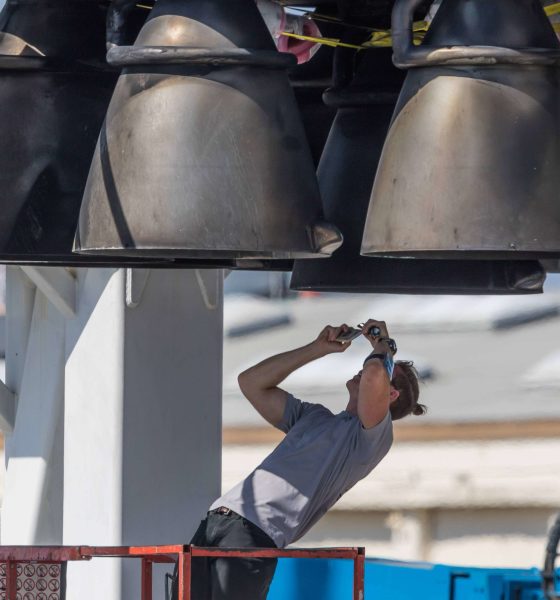
News
SpaceX set to launch its first previously-flown Block 5 rocket tonight
At the same time as SpaceX is readying its first Falcon 9 Block 5 booster reuse, the company’s second flight-proven Block 5 launch is already fast approaching and could be a strong contender to beat the company’s record of 72 days between launches of the same rocket.
A critical milestone for Falcon 9 Block 5
Formerly known as Telkom 4, SpaceX’s 1:18 AM EDT August 7th launch of the Merah Putih (Red and White in Indonesian) communications satellite will place the 5800 kg (12,800 lb) craft into a high-energy geostationary transfer orbit and will become the second heaviest GTO launch completed by SpaceX while still recovering the Falcon 9 booster. More importantly, however, Telkom 4 will also mark a critical milestone for Falcon 9 as the first reuse of a Block 5 booster.
https://twitter.com/_TomCross_/status/1025074341040533504
Designed to be many times more reusable and reliable than the already impressive Falcon 9 Full Thrust iterations preceding it, pathfinder booster B1046 could be capable of flying anywhere from 5, 10, or even 100 launches over the course of its flightworthy lifespan. It very well may require some considerable refinements to approach the true goal of orbital Falcon 9 launches with zero refurbishments between flights. CEO Elon Musk discussed those aspirations just before Block 5’s launch debut on May 11:
“We need to basically take the rocket from its landing pad, rotate it horizontal, stow the legs. Take it to the launch pad, attach an upper stage, attach a fairing with a payload. Then transport it out the launch pad, rotate it vertically, load propellant, and fly. And in principle, that is literally all that’s necessary.” – Elon Musk
This is understandably SpaceX’s goal, and it’s unlikely to happen just a few months after Block 5’s debut. Nevertheless, SpaceX appears to be already pushing the envelope of what they’ve previously accomplished with reusable Falcon 9s.
- B1046 lifts off for the first time on May 4th, 2018. (Teslarati)
- Falcon 9 B1046 returned to Port Canaveral aboard drone ship OCISLY on May 15. It will launch for the second time on August 4. (Tom Cross)
- Soon after, B1046 was spotted on its way to a refurbishment facility around a week after its May 11 launch debut. (Instagram /u/tersco)
Breaking records four months after launch debut
While B1046 is tracking towards a booster turnaround of roughly 92 days, compared with the current Block 4 booster record of 72 days, it’s worth noting that more than a majority of that time was likely spent in a state of unique analysis for the inaugural Block 5 rocket, involving extensive disassembly. As stated by Musk, “we need to take [B1046] apart to confirm that it does not need to be taken apart.” He also expected that teardown analysis to be “very rigorous”, indicating that B1046 probably deserves the crown for booster turnaround so long as one only accounts for time spent in transport and undergoing refurbishment.
Still, winning by a technicality is never any fun. On that note, SpaceX appears to be tracking towards a true record-breaking rocket reuse, potentially as few as 40 days between launches. Not one to let its other launch facilities be left out, this record-breaking turnaround attempt will occur on the West Coast with Falcon 9 B1048, the recovery of which has been extensively documented by Teslarati photographer Pauline Acalin over the last two weeks. NASASpaceflight.com confirmed that SpaceX intends to reuse B1048 for this mission for the NET mid-September launch and the record ~50 days between flights could help explain an unusually extensive and lengthy analysis of the rocket after it was lifted off drone ship Just Read The Instructions and placed on its dockside recovery stand.
- B1047 before the launch of Telstar 19V. (Tom Cross)
- Sooty B1047 arrives at Pad 39A’s horizontal integration facility (HIF), July 31st. (Reddit – Kent767)
- Falcon 9 B1048 ahead of its launch debut, July 25th. (Pauline Acalin)
- After a successful launch and landing, B1048 stands tall in Port of San Pedro before being lowered and transported for its next launch. (Pauline Acalin)
After 10 days of recovery operations and analysis, B1048 was transported to SpaceX’s Hawthorne factory on August 6th, where it will presumably undergo refurbishment in preparation for its next launch. If B1046 and B1048 are representative samples of SpaceX’s growing rocket fleet, their stunningly quick turnarounds (especially for a largely new rocket that debuted less than 3-4 months prior) are likely a sign of things to come as SpaceX gets a handle on the real-world capabilities of its robust Block 5 upgrade.
It’s entirely possible that every Block 5 reuse to come can and will break the previous launch turnaround record, at least up to the point that SpaceX demonstrates a true 24-hour turnaround sometime next year. Stay tuned…
For prompt updates, on-the-ground perspectives, and unique glimpses of SpaceX’s rocket recovery fleet (including fairing catcher Mr Steven) check out our brand new LaunchPad and LandingZone newsletters!

News
Tesla ships out an update for everyone that California caused
“This change only updates the name of certain features and text in your vehicle,” the company wrote in Release Notes for the update, “and does not change the way your features behave.”

Tesla has shipped out an update for its vehicles that was caused specifically by a California lawsuit that threatened the company’s ability to sell cars because of how it named its driver assistance suite.
Tesla shipped out Software Update 2026.2.9 starting last week; we received it already, and it only brings a few minor changes, mostly related to how things are referenced.
“This change only updates the name of certain features and text in your vehicle,” the company wrote in Release Notes for the update, “and does not change the way your features behave.”
The following changes came to Tesla vehicles in the update:
- Navigate on Autopilot has now been renamed to Navigate on Autosteer
- FSD Computer has been renamed to AI Computer
Tesla faced a 30-day sales suspension in California after the state’s Department of Motor Vehicles stated the company had to come into compliance regarding the marketing of its automated driving features.
The agency confirmed on February 18 that it had taken a “corrective action” to resolve the issue. That corrective action was renaming certain parts of its ADAS.
Tesla discontinued its standalone Autopilot offering in January and ramped up the marketing of Full Self-Driving Supervised. Tesla had said on X that the issue with naming “was a ‘consumer protection’ order about the use of the term ‘Autopilot’ in a case where not one single customer came forward to say there’s a problem.”
This was a “consumer protection” order about the use of the term “Autopilot” in a case where not one single customer came forward to say there’s a problem.
Sales in California will continue uninterrupted.
— Tesla North America (@tesla_na) December 17, 2025
It is now compliant with the wishes of the California DMV, and we’re all dealing with it now.
This was the first primary dispute over the terminology of Full Self-Driving, but it has undergone some scrutiny at the federal level, as some government officials have claimed the suite has “deceptive” names. Previous Transportation Secretary Pete Buttigieg was one of those federal-level employees who had an issue with the names “Autopilot” and “Full Self-Driving.”
Tesla sued the California DMV over the ruling last week.
News
Tesla workers push back against Giga Berlin unionization
“IG Metall did not succeed in Giga Berlin‘s works council election earlier today. The union share was reduced from nearly 40% in 2024 to 31% in 2026! This is a clear message by the Giga Berlin team towards an independent co-determination! The list called Giga United, led by the current chairwoman, Michaela Schmitz, received the most votes with more than 40%! Good news for Giga Berlin!”

Tesla workers pushed back against unionization efforts at Gigafactory Berlin, and over the past few years, there has been a dramatic decrease in interest to unionize at the German plant.
Gigafactory Berlin Plant Manager André Thierig announced on Wednesday that IG Metall, the European union group, saw its share reduce from 40 to 31 percent in 2026 as employees eligible to vote on the issue. Instead, the Giga Berlin team, known as Giga United, received the most votes with more than 40 percent.
BREAKING! 🚨
IG Metall did not succeed in Giga Berlin‘s works council election earlier today. The union share was reduced from nearly 40% in 2024 to 31% in 2026!
This is a clear message by theGiga Berlin team towards an independent co-determination!
The list called Giga…
— André Thierig (@AndrThie) March 4, 2026
Thierig gave specific details in a post on X:
“IG Metall did not succeed in Giga Berlin‘s works council election earlier today. The union share was reduced from nearly 40% in 2024 to 31% in 2026! This is a clear message by the Giga Berlin team towards an independent co-determination! The list called Giga United, led by the current chairwoman, Michaela Schmitz, received the most votes with more than 40%! Good news for Giga Berlin!”
There were over 10,700 total employees who were eligible to vote, with 87 percent of them turning out to cast what they wanted. There were three key outcomes: Giga United, IG Metall, and other notable groups, with the most popular being the Polish Initiative.
The 37-seat council remains dominated by non-unionized representatives, preserving Giga Berlin as Germany’s only major auto plant without a collective bargaining agreement.
Thierig and Tesla framed the outcome as employee support for an “independent, flexible, and unbureaucratic” future, enabling acceleration on projects like potential expansions or new models. IG Metall expressed disappointment, accusing management of intimidation tactics and an “unfair” campaign.
The first election of this nature happened back in 2022. In 2024, IG Metall emerged as the largest single faction with 39.4 percent, but non-union lists coalesced for a majority.
But this year was different. There was some extra tension at Giga Berlin this year, as just two weeks ago, an IG Metall rep was accused by Tesla of secretly recording a council meeting. The group countersued for defamation.
Tesla Giga Berlin plant manager faces defamation probe after IG Metall union complaint
This result from the 2026 vote reinforced Tesla’s model of direct employee-management alignment over traditional German union structures, amid ongoing debates about working conditions. IG Metall views it as a setback but continues advocacy. Tesla sees it as validation of its approach in a competitive EV market.
This outcome may influence future labor dynamics at Giga Berlin, including any revival of expansion plans or product lines, which Musk has talked about recently.
News
SpaceX President Gwynne Shotwell details xAI power pledge at White House event
The commitment was announced during an event with United States President Donald Trump.

SpaceX President Gwynne Shotwell stated that xAI will develop 1.2 gigawatts of power at its Memphis-area AI supercomputer site as part of the White House’s new “Ratepayer Protection Pledge.”
The commitment was announced during an event with United States President Donald Trump.
During the White House event, Shotwell stated that xAI’s AI data center near Memphis would include a major energy installation designed to support the facility’s power needs.
“As you know, xAI builds huge supercomputers and data centers and we build them fast. Currently, we’re building one on the Tennessee-Mississippi state line. As part of today’s commitment, we will take extensive additional steps to continue to reduce the costs of electricity for our neighbors…
“xAI will therefore commit to develop 1.2 GW of power as our supercomputer’s primary power source. That will be for every additional data center as well. We will expand what is already the largest global Megapack power installation in the world,” Shotwell said.
She added that the system would provide significant backup power capacity.
“The installation will provide enough backup power to power the city of Memphis, and more than sufficient energy to power the town of Southaven, Mississippi where the data center resides. We will build new substations and invest in electrical infrastructure to provide stability to the area’s grid.”
Shotwell also noted that xAI will be supporting the area’s water supply as well.
“We haven’t talked about it yet, but this is actually quite important. We will build state-of-the-art water recycling plants that will protect approximately 4.7 billion gallons of water from the Memphis aquifer each year. And we will employ thousands of American workers from around the city of Memphis on both sides of the TN-MS border,” she noted.
The Ratepayer Protection Pledge was introduced as part of the federal government’s effort to address concerns about rising electricity costs tied to large AI data centers, as noted in an Insider report. Under the agreement, companies developing major AI infrastructure projects committed to covering their own power generation needs and avoiding additional costs for local ratepayers.
